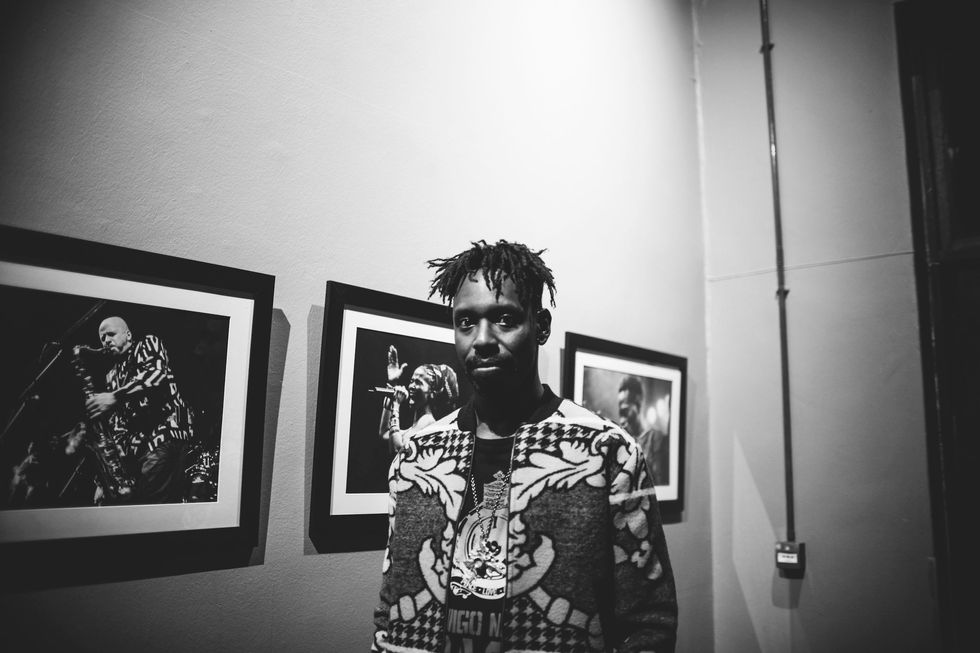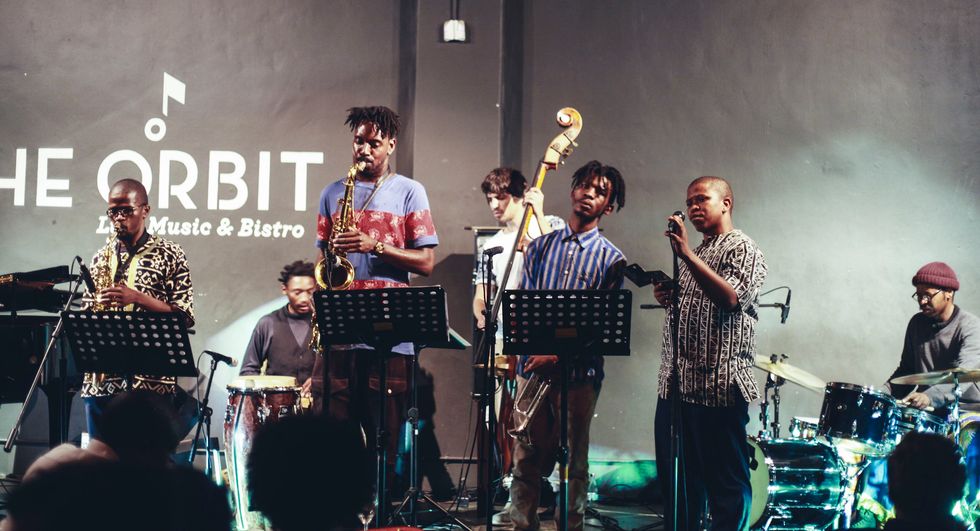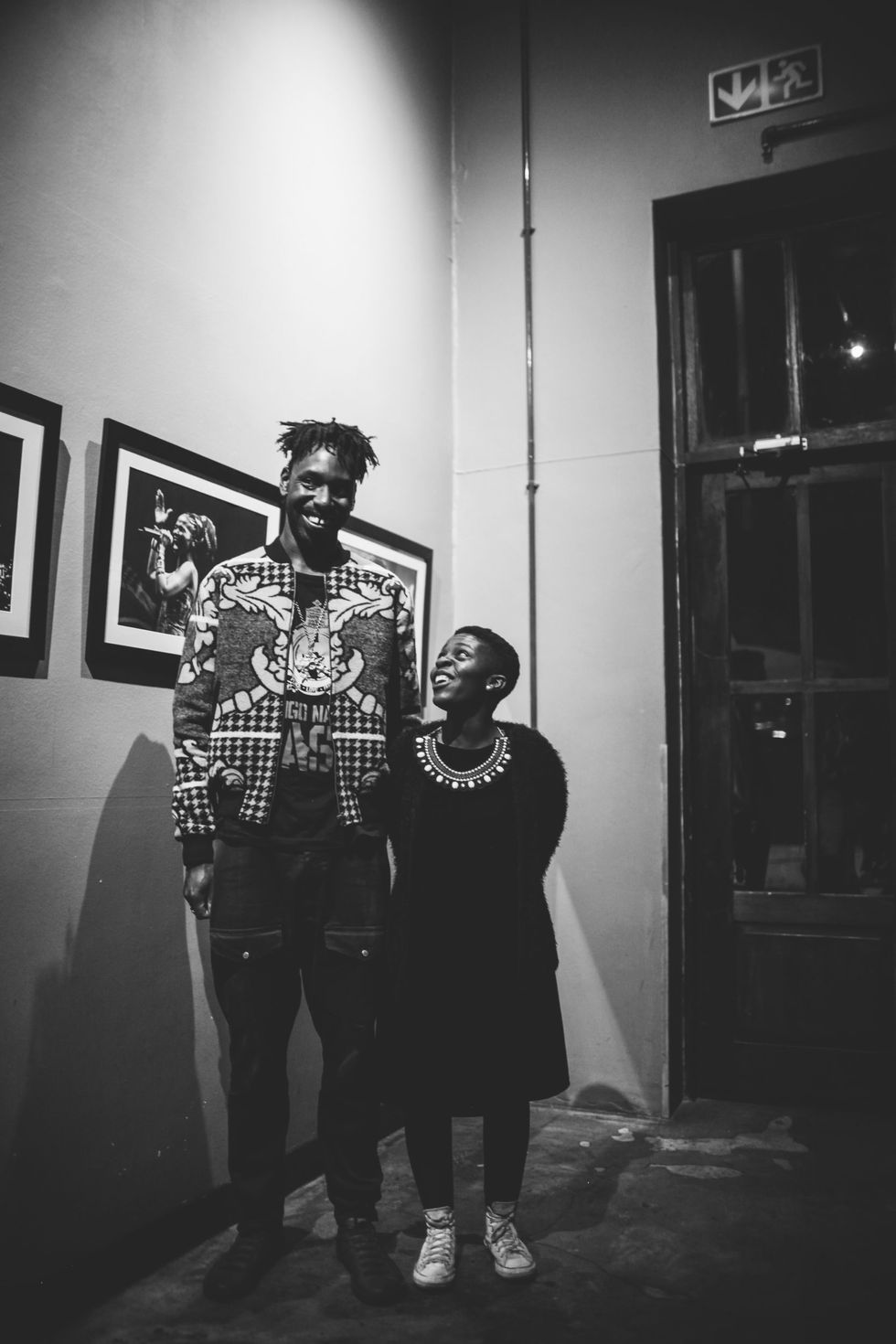Shabaka Hutchings on the New Generation of Jazz
UK saxophonist Shabaka Hutchings takes us inside Shabaka and the Ancestors' debut album, 'Wisdom of Elders'

My first encounter with U.K. saxophonist Shabaka Hutchings was in 2015 at Inside Out Jazz Lounge in Soweto, an intimate live music venue in the home of renowned percussionist Thebe Lipere.
Hearing that Amel Larrieux had dropped by for an impromptu performance, I quickly rushed over to catch a glimpse of the singer. Unfortunately, she had already left by the time I arrived. What I did find, though, was the Amandla Freedom Ensemble playing with a spirited and unusually tall tenor saxophonist. Moving in unison with the rapid bellows of his horn, his body bowed and bopped in a way that was nothing short of infectious.
The towering tenor man, I later learned, formed part of the U.K. bands Sons of Kemet and The Comet is Coming. A bandleader and composer, it was not surprising to hear that Hutchings’ frequent visits and collaborations with South African musicians had culminated into a new band: Shabaka and the Ancestors.
Comprised of Hutchings alongside The Brother Moves On lead singer, Siyabonga Mthembu, trumpeter Mandla Mlangeni, drummer Tumi Mogorosi, alto saxophonist Mthunzi Mvubu, percussionist Gontse Makhene, double bassist Ariel Zamonsky and pianist Nduduzo Makhathini, the group’s debut project, Wisdom of Elders, was recorded in 2015 in Johannesburg.
I sat down for an interview with the Shabaka and the Ancestors bandleader while he was in Johannesburg prior to the album’s September release on Gilles Peterson’s Brownswood Recordings.
The following interview has been edited and condensed.
Tell us about yourself…
My name is Shabaka Hutchings. I play saxophone clarinet and compose. In the U.K. I play with Sons of Kemet and The Comet is Coming, and the new group Shabaka and the Ancestors in South Africa. I started playing clarinet in Barbados where I grew up and just kind of drifted into jazz and saxophone in my early teens.
How did growing up in Barbados shape your musical journey?
My mom took me to Barbados when I was six, mainly because the education system in England at that point was pretty shit if you don’t have money and especially if you were Black. She was an English teacher and could really see the system from the inside. The odds of a boy of a single mom, that’s not rich, succeeding were pretty low. And that’s what happened to her—her mom had sent her to Barbados to study for high school and came back, so she did the same thing for me.
Being in Barbados I started learning the clarinet, and coming back to England I kinda felt like I had a head start on a lot of things. I didn't really have a focus of what I thought I was musically. I played classical music in the same week, or the same breath that I'd played calypso. I played jazz, or reggae. There wasn't a defining element to the kind of musician that I was. I just kind of played, and that was cool.

There is a sense of community that is very strong in jazz culture. There are many benefits to this, but there is also an exclusionary aspect in terms of jazz being a “boys club”—what do you think attributes to this?
In terms of the boys club and the inaccessibility of the music, it feels to me like jazz is lacking a better term—in some ways it’s like racism, it’s like the definitions of it stopped at a certain point and so people talk around the issues that have already been named and come up with secondary problems because you can’t really talk about things that don’t have a name. What people call the golden era of jazz is also the era of chauvinism, you know. The era of men not even considering that the space might be predominantly male.
The music, I guess, was trying to stand to classical music, which is an elitist music. It was trying to present itself on the platform that says “we are equal to that.” When you listen to interviews with the guys in the bebop era, they were going “our music is art, our music is high art and we want it to be considered like that.” And that’s great for the period of time they were in, but it needs to be acknowledged that they’re trying to, like Gil Scott-Heron says, “chasing the white ghost.”
They’re trying to present as equal to this kind of high art, classical music, and that classical music isn’t inclusive, so what they’re chasing after is a realm of exclusivity. But it feels like there’s this new generation that’s actually like: “Fuck it, we’re not trying to make our music a classical music, what is classical music? It’s got nothing to do with us and we don’t need to prove ourselves in that respect. We want to play for our peers and that doesn’t mean we’re not playing jazz or music from the jazz lineage and jazz tradition.”
It doesn't mean that they're not playing music that comes out of the same lineage, the same jazz canon, the same jazz tradition, but maybe the end point isn't the same. What you want out of the music, or the reference you want the audience to feel from the music may not be the same.

How do you see the jazz audience and how does it affect you as a musician?
That's a tough one. There's a couple of different elements. One is the bands that I play in in South Africa are quite different to the bands that I play in in the U.K. The bands in the U.K., they don't generally play in situations where people are eating while we play. And there are places to play while people are eating, or occupied in other ways, but that's not our vibe. It seems like for a lot of the young musicians, that's a thing. That's a standard jazz club thing, and I guess it comes from America where it's like the music is just a commodity within other commodities of which the digestion of food is one of them. The stuff that I do in England, we're not playing music for that purpose.
It's a different energy if people are there to hear a concert, and that's the sole purpose. That's not to take anything away from The Orbit [in Braamfontein, Johannesburg], because it's going in the lineage of jazz clubs in the States, and that's a strong lineage. That's the set up, and that's cool, and it works.
You do get a different vibe to a concert scenario, or even a club scenario where the focus is just on the music, or maybe the audience isn't seated. I find that creates a different energy, even if it's not dance-based music, if the audience isn't seated, and they're like in your face.

If there's a table there, there's a natural separation between you and the first guys in the audience. That gap separates everything. If the audience is closer, then it creates more of an energy, and there's more of an interchange, more of an interplay between you and the actual crowd.
Jazz has that attachment to that vibe of being seen to be high art. You get some people that are coming because they're jazz aficionados, some people that are coming because jazz is supposed to be cool, or it's supposed to be what you do when you've achieved some kind of social currency. Some people come in just because they like the music, and they like the sound of it. All of that's cool, it's good to have diverse audience members. It's just when the balance gets tipped. How many people are coming because it's just supposed to be a high society thing? How many people are coming just because they like the music?
I claim jazz as heritage because it reminds me of Sundays in the townships, it reminds me of Christmas and my father. What is the personal connection between music and heritage for you? Even with regards to Shabaka and the Ancestors?
The first thing that pops into my mind when I think musical heritage is Carnival in the Caribbean, and that feeling of the whole island, everyone being immersed in music. Every single person. On the same level. It's a strange thing, when I've come to England, and seen Carnival, there's always a dynamic of the performers, or the attendees, and the onlookers looking at people having fun.
Whereas in the Caribbean, people are onlooking, but there's a different energy. There's an energy of, "We're all in it. We're all a part of it this Carnival.” There's no bystanders watching the people having fun. That's what I think of when I think of musical heritage, and that feeling you get from the music, the way people are engaging with the music.
You’re no stranger to South African stages. When did your relationship with South Africa start? What was the jump-off for Shabaka Hutchings?
I met Nduduzo [Makhathini, the South African jazz musician] from a gig we were both playing in Cape Town, and we just liked each other's playing. He said he had a gig in Lagos, and they had money to fly people over. He said, "Do you want to do the gig?" That's the first time I played with him in Lagos. And then it's just been, the more I've come over, the more I've met different musicians, and solidified the guys that I really like to play with.
South African jazz for me is the sound of resistance—what are the themes and characteristics that set South African jazz apart for you?
For me, the thing that really gets me about South African jazz is the points of energy. If I compare it to most of the guys that I play with in England, it feels like they have a trajectory where they've got a concept of tension and release. They go from a point of non-tension and they build towards a point in the music where there's a big intensity, and then it goes down from that. You go from a point of calmness, you get a bit intense, or you get very intense, and then you go down from that.
Whereas in a lot of the guys that I've played with in South Africa, it seems that they get to that point of intensity quicker, and they hold onto it for longer. Sometimes, that point of intensity comes from the melody. As soon as the melody comes, they're in it. It doesn't go down. It stays there.

In that Herbie Tsoaeli’s album [African Time], the first track on that where Sisonke Xonti plays the solo, it's like, as soon as they come in at that melody, it's in, that's it. That could have been the big moment in any solo, and they just step into that realm, and they live in it. They're in that world of intensity and high energy. It's like, bam, you're in. You're not in that world, you're in this world, and you're not trying to slowly get into it. It's like you pull back the curtains, and that's it.
That's the one thing that I've learnt from that, especially playing with someone like Tumi [Mogorosi]. Once he's on the drums, that's it, you're in that world. There's no finding your way, or slow motive development, or all those things that they teach you in college. You can have all those things, you can have motive development. But the energy has to be there, the intent, because if you're playing music, you've got to have that intent in every single note.
What was the creative process of making the album?
I was supposed to be on holiday last January, but instead of relaxing I kind of wrote an album. I had four weeks in Cape Town, and then one week in Johannesburg. I was like, "If you've got nothing to do," I thought, "Okay, I'll work on this song a bit, and then work on that song.” And then I had an album, and I booked a studio. I kind of had it in my head that I'd record an album in Johannesburg. I just called the guys and said, "Do you want to play the music?" We had one rehearsal, one gig in the Afrikan Freedom Station, and then one day in the studio. Most of the takes were one takes. A couple we did two, but it was all just like, "Get it out."
I didn't have a record label, or anything. I just paid for it all myself. I just wanted to see what would happen with it. I think that's maybe what's added to the vibe of the album, just the fact that there wasn't any real pressure to make it. There wasn't any expectation. If nothing came out of it, or if only three tracks came out of it, that would've been fine with me.
In terms of running themes, I didn't really write it with a mind to do an album. There are themes in my life that I was thinking about, and those were obviously coming into the music, but I wasn't saying, "This is a song about this, this area of life, or this struggle, or this particular time."
It's weird, I feel like that's generally the way that I approach music in that I very seldom go into a compositional space with a preconceived idea, saying, "This song is about this area." I generally free-write. I just get stuff out. Then when I listen back to it, or see what's actually happened when it's formed itself, then I maybe go, "Okay, maybe I can see that that relates to this area that I was thinking about."
Sometimes I'll write, and then when I go back to it, I can be like, "Oh, okay, I can see that this tune relates to this area, or that the vibe of this tune relates to this thing that I was thinking about or seeing that was happening around me."
When I write, I try to not be overtly influenced by what I think is affecting me. The thing is like, if things affect you, they affect you whether you go to the composition or not, they're still going to be, you're still made up of all of those things that are influencing you. I didn't go into it with a thought of an overall plan of, "this is what the album represents.” But it is a product of the time that I was in, and the other guys were experiencing in South Africa, which obviously is the time of #FeesMustFall, and the time of a discontent, or a re-evaluation of the status quo from a generation that it had been bubbling from. I'm not trying to say this album is that, but the album was made within that time.
Vuyiswa Xekatwane is a Biko black aspiring writer with a passion for jazz and bacon.

